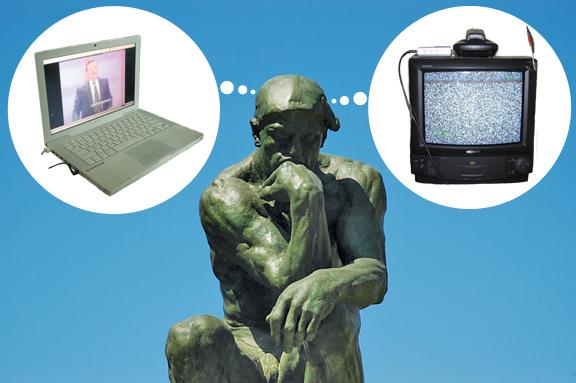TV companies need to rethink digital strategy

Graphic: Logan Gaedke/Iowa State Daily
Opinion – TV or Internet?
October 24, 2010
News corporations and television studios need to stop trying to dictate what I watch and when I want to watch it.
It seems that the media industry is fighting the transition to digital media at every turn and has been doing so for more than a decade. Cable companies and news stations make big bucks by charging you for the 100-plus channels normally available on cable or satellite TV and then charging companies to advertise to you.
It makes sense that they don’t want to give up their big paychecks as the world slowly realizes that structured television programming isn’t necessary in today’s digital age. But they need to realize that they must adapt to the new viewing environment or be left behind.
I know that, personally, I see very little difference between going online to play back an episode of my favorite shows and sitting on my couch and watching them on TV. Heck, if I wanted to watch the shows that stream from the Internet on my TV, there are a multitude of devices that will allow me to stream the shows to the TV from the Internet like the Roku box.
If I have a choice between paying $80 and $100 per month for cable television and paying $50 per month for only Internet access, I would pick Internet-only hands down. I’m sure that considering the options, you would probably do the same. You could even throw in a subscription to Hulu Plus or Netflix for an extra $10 or $15 per month and still save money.
Years ago, it all began with the networks laying out their battle plans against consumers who could decide to make digital copies or backups of their digital media. Those battle plans turned into legislation known as the Digital Millennium Copyright Act which criminalized any measures of circumventing digital privacy protection software, which they then proceeded to add to all digital media. So, while I can grab two VCRs and copy VHS tapes as much as I want, it is technically illegal for me to make similar copies digitally with DVDs or Blu-Ray disks.
Over time, media companies slowly allowed their creations to percolate online through Amazon, iTunes and Hulu, where they can still be carefully controlled — not by you, the purchaser, but by them, the creators. Should they decide to no longer let you re-download the content or should they no longer support that service after you lose your copy, there is no getting it back — a good reason to still buy physical disks.
You may also run into the issue that some services like iTunes won’t let you display the shows or movies you paid for if you are not using devices with High-bandwidth Digital Copy Protection, another DMCA lockdown for digital media.
The latest salvo in this battle happened the other day when News Corp, the owner of Fox Networks, forced Hulu to remove Fox content from Hulu, but only for customers of Cablevision, a large East Coast cable telecom company.
Why would News Corp want to selectively remove the content flowing to users of one utility provider? To show Cablevision it meant business, as the two companies negotiated over the increased rates that News Corp wants from cable companies for the Fox Networks channels.
Hours later News Corp turned back on the Fox shows on Hulu as it changed tactics in the battle for higher fees, but it demonstrated that a service we consider “free” or “ad-supported” on the Internet is really only free as long as our Internet service provider is paid up with the right people.
My other problem with the current digital distribution model is that while Hulu and broadcasters’ websites — Fox.com, CBS.com, etc. — let me watch TV programs online, some shows appear for online viewing while others don’t, and some shows appear the next day while others take more than a week. Yes, maybe I was busy during the one hour that “House” was on last night and missed the new episode, but then I am forced to wait a week to catch the episode I missed?
This just seems like a massive annoyance and from what I see online, it is based on the fact that cable and broadcast TV companies are paying a premium for the fact that you can only see each episode on TV for a week before it appears on the Internet. Then, of course after giving the networks this exclusive right, the producers complain when people share the episode online over video-sharing services because the producers provided no ad-supported alternatives.
It seems like those show producers are digging their own graves by not listening to their end-customers.
If the problem is money, I think the producers, networks and cable companies need to figure out how to make the amount of money they feel like they need online or take a pay cut. They are just going to alienate viewers by blocking access to shows online while complaining about viewers who download illegal digital copies of their shows when given no other legal option.
I think a lot of people would be happy to watch ad-supported versions of their favorite shows online rather than pirate ad-less content from a file-sharing service on the other side of the world, but with no options to catch up on their favorite show, they simply take the only option available. I hope the media companies grow up and realize that times are changing and generation Y is not tied down to its old scheduled programming model.
Working against us will only hurt them in the long run.
















